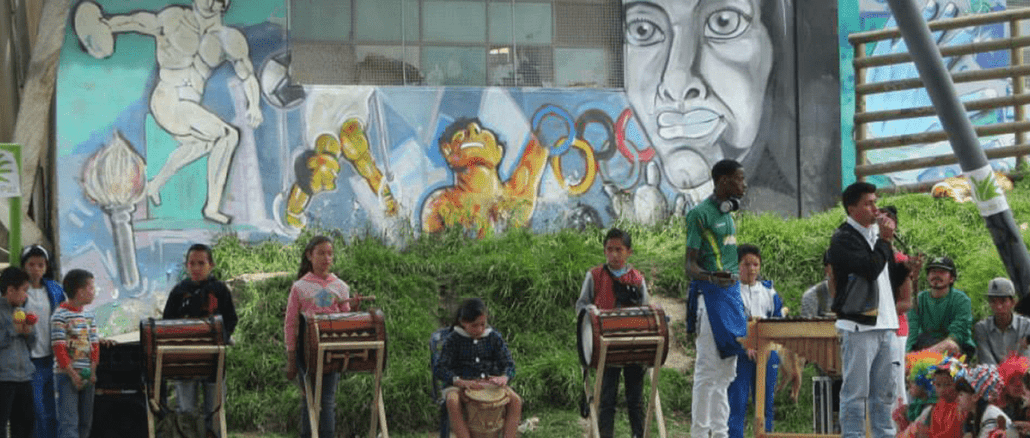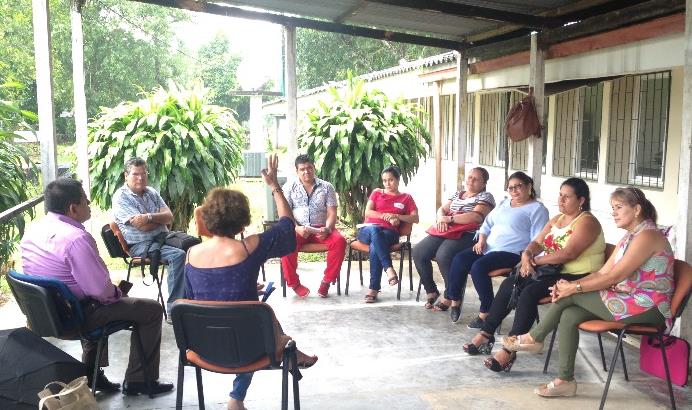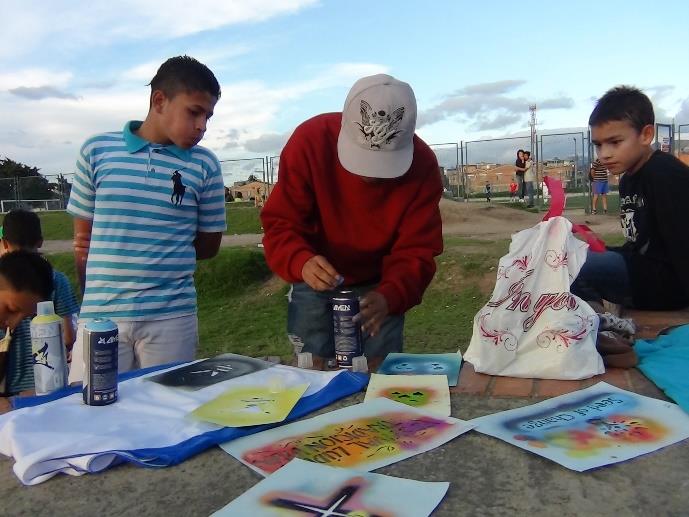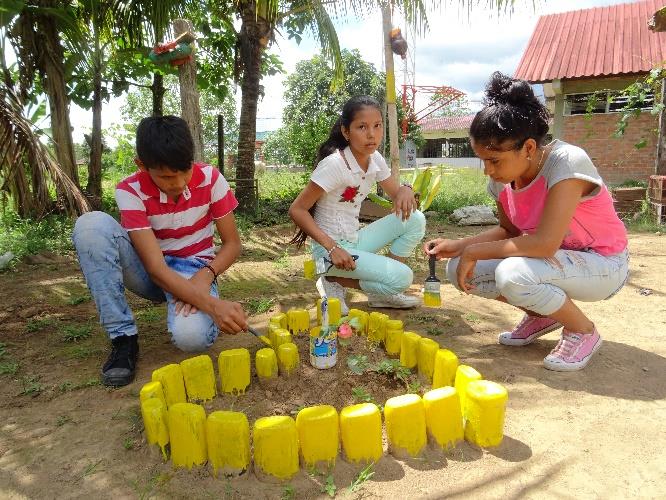
By Amada Benavides de Pérez, April 11, 2020
From Global Campaign for Peace Education
For peace, welcome
For children, freedom
For their mothers, life
To live in tranquility
This is the poem Juan[1] wrote on World Peace Day, last September 21, 2019. Together with other youth, he participated in our program. They sang songs and wrote messages alluding to this date, with hope as a banner, being inhabitants of a territory where former FARC had its headquarters and today are peace territories. However, on April 4, new actors in the war blinded the life of this young man, his father – a peasant union leader – and another of his brothers. All this in the midst of the curfew imposed by the Government as a measure to control the COVID -19 pandemic. This first-person example shows the multiple threats that occur in countries with latent armed and social conflicts, such as the case of Colombia.
“There are those for whom, sadly, ‘stay home’ is not an option. It is not an option for many families, many communities, due to the recurrence of armed conflict and violence,”[2] were words of the Goldman Prize award, Francia Márquez. For her and other leaders, an eventual arrival of COVID-19 cases worsens the anxiety that these communities are experiencing due to armed confrontations. According to Leyner Palacios, a leader living in Choco, in addition to COVID-19, they must deal with “the pandemic” of not having “aqueducts, medicines, or medical personnel to attend to us.”
The epidemic and control measures to prevent its spread have affected differently upper and upper-middle urban class contexts, great urban mass living on informal economy, and deep rural Colombia.

More than 13 million people live in Colombia in the informal economy, looking every day to find little money to subsist. This group includes people who depend on informal sales, micro and small entrepreneurs, women with precarious jobs, and historically excluded groups. They have not complied with restrictions imposed, because for this population the dilemma is, in their own words: “die from the virus or starve.” Between March 25 and 31 there were at least 22 different mobilizations, 54% of which occurred in capital cities and 46% in other municipalities.[3] They asked the Government for support measures, which, although they have been granted, are insufficient, since they are measures carried out from paternalistic visions and are not supportive or attend to comprehensive reforms. This population is forced to break the isolation restrictions, creating imminent risks for their lives and their communities. Coupled with that, in these moments connection between the informal economy and the illegal economy will grow and increase social conflict.
In relation to rural Colombia, as Ramón Iriarte appointed, “The other Colombia is a country in perpetual ‘quarantine.’ People flee and hide because they know that here threats are faced.” During the last weeks of March there were signs of dynamics that could occur during this pandemic: aggressions and killings of social leaders, new events of forced displacement and confinement, renewed flow of international migrants and goods due to illegal trails, riots and protests in some cities, increase in forest fires in regions such as the Amazon, and the opposition of some populations to forced eradication of illicit crops. On the other hand, Venezuelan migration, counted today in more than one million eight hundred thousand people, who live in very precarious conditions, without access to food, housing, health and decent work. It is important to consider what the effects may be in the border area, closed as part of measures to respond to the virus. There, government humanitarian assistance is limited and much of the response is provided by international cooperation, which has notified temporary suspension of its activities.
According to Fundacion Ideas para la Paz[4], COVID-19 will have an impact on armed conflict dynamics and on the implementation of the peace agreement, but its effects will be differentiated and not necessarily negative. ELN’s pronouncement of a unilateral ceasefire and the Government´s new appointment of Peace Managers are news that bring some hope.
Finally, isolation also implies intra-family violence increases, especially against women and girls. Coexistence in small spaces grows the levels of conflict and aggression against the weakest. This may be evident in many settings, but it has a greater impact in armed conflict areas.

So the question is: what are the actions that must be addressed in these crisis moments, both at government level, international community, and civil society?
One of the important pandemic consequences is the recovery of public sense and State obligations to the integral guarantee of human rights and human dignity. This includes the need to regulate employment conditions in a new digital age. The question in these scenarios is, how can fragile states resume public policy direction, when their capacity is limited, even in normal situations?
But giving greater State power and control can also give way to adoption of repressive, coercive and authoritarian measures, such as what has happened in countries where extreme repressive decrees imposing an armed curfew and threats to enforce measures with Army´s support. Subjugating bodies and controlling the population from Biopower were premises that Foucault anticipated in the last century.
An intermediate alternative has emerged from local governments. From New York to Bogotá and Medellín, they have given more timely and effective responses to the population, in contrast with homogeneous and cold ones taken from national entities. Strengthening these operations and the capacities from local functionaries and levels is important, with respective connections with national and transnational actions. Work locally, to impact globally.

For peace education, it is an opportunity to delve into issues and values that have been flags of our movement: reinforce ethics of care, which implies attention to ourselves, to other human beings, other living beings and the environment; strengthen the requirement of comprehensive protection of rights; advance in the commitment to eliminate patriarchy and militarism; rethink new economic ways to reduce consumption and protect nature; handle conflicts in nonviolent ways to avoid increasing intrafamily abuse in times of confinement and at all times.
There are many challenges, many opportunities to permit Juan and other young people with whom we work to say:
For life, the air
For the air, the heart
For the heart, love
For love, illusion.
Notes & References
[1] Simulated name to protect his identity
[2] https://www.cronicadelquindio.com/noticia-completa-titulo- victimas-del-conflicto-claman-por-cese-de-violencia-ante- pandemia-cronica-del-quindio-nota-138178
[3] http://ideaspaz.org/media/website/FIP_COVID19_web_FINAL_ V3.pdf
[4] http://ideaspaz.org/media/website/FIP_COVID19_web_FINAL_V3.pdf
Amada Benavides is a Colombian teacher with a degree in education, postgraduate studies in social sciences and international relations. She has worked in all levels of formal education, from high schools to postgraduate faculties. Since 2003, Amada has been president of the Peace Schools Foundation, and since 2011 fully dedicated to promoting cultures of peace through peace education in Colombia in formal and non-formal contexts. From 2004 -2011, she was a Member of the United Nations Working Group on the Use of Mercenaries, Office of the High Commissioner of Human Rights. She is now working in post-conflict territories occupied by the FARC, supporting teachers and youth in the implementation of the peace agreements.








